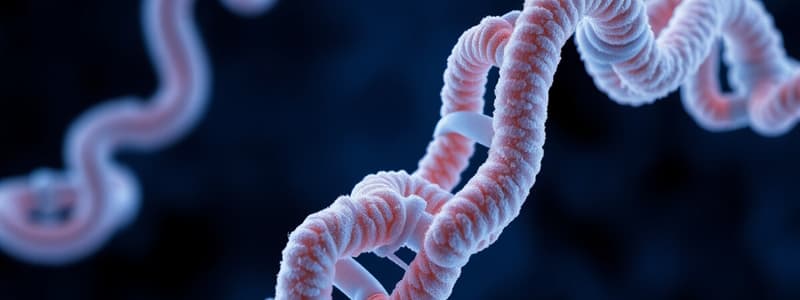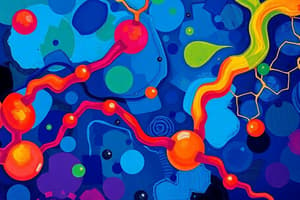Podcast
Questions and Answers
What effect does epinephrine have on glycogen metabolism?
What effect does epinephrine have on glycogen metabolism?
- It inactivates glycogen synthetase.
- It promotes glycogenesis.
- It inhibits glycogenolysis.
- It activates glycogen phosphorylase. (correct)
Which enzyme is primarily responsible for glycogen synthesis?
Which enzyme is primarily responsible for glycogen synthesis?
- Glycogen synthase D
- Glycogen phosphorylase
- Phosphorylase kinase
- Glycogen synthase I (correct)
What activates phosphorylase kinase in glycogen metabolism?
What activates phosphorylase kinase in glycogen metabolism?
- Increased levels of cAMP (correct)
- Excess ATP
- High levels of glucose
- Decreased calcium ions
Which of the following is true about glycogen phosphorylase?
Which of the following is true about glycogen phosphorylase?
What molecular signal is primarily involved in the regulation of glycogen phosphorylase?
What molecular signal is primarily involved in the regulation of glycogen phosphorylase?
In the context of the inhibitory mechanism, what is the role of inhibitor 1?
In the context of the inhibitory mechanism, what is the role of inhibitor 1?
What is the primary function of glycogen synthase?
What is the primary function of glycogen synthase?
How does phosphorylation affect glycogen metabolism?
How does phosphorylation affect glycogen metabolism?
What is the role of protein phosphatase 1 in the regulation of glycogen synthase?
What is the role of protein phosphatase 1 in the regulation of glycogen synthase?
Which form of glycogen synthase is active and does not require glucose-6P?
Which form of glycogen synthase is active and does not require glucose-6P?
What activates protein kinase A (PKA) in the glycogen metabolism pathway?
What activates protein kinase A (PKA) in the glycogen metabolism pathway?
How is glycogen synthase D inactivated?
How is glycogen synthase D inactivated?
What is the effect of cAMP on glycogen synthase?
What is the effect of cAMP on glycogen synthase?
Which substrate is converted into UDP-Glucose in glycogen synthesis?
Which substrate is converted into UDP-Glucose in glycogen synthesis?
What is the primary function of UDP-Glucose in glycogen synthesis?
What is the primary function of UDP-Glucose in glycogen synthesis?
Which of the following statements is true regarding glycogen synthase regulation?
Which of the following statements is true regarding glycogen synthase regulation?
What is the effect of insulin on glycogen metabolism?
What is the effect of insulin on glycogen metabolism?
What role does protein phosphatase 1 play in insulin signaling?
What role does protein phosphatase 1 play in insulin signaling?
What happens to phosphorylase activity when insulin is present?
What happens to phosphorylase activity when insulin is present?
Which component is directly increased by insulin activation through the signaling pathway?
Which component is directly increased by insulin activation through the signaling pathway?
What is the ultimate result of insulin-mediated activation of protein phosphatase 1?
What is the ultimate result of insulin-mediated activation of protein phosphatase 1?
Which of the following processes does insulin NOT promote?
Which of the following processes does insulin NOT promote?
How does insulin affect the balance between glycogenesis and glycogenolysis?
How does insulin affect the balance between glycogenesis and glycogenolysis?
Which phosphorylated form of glycogen phosphorylase is active in glycogenolysis?
Which phosphorylated form of glycogen phosphorylase is active in glycogenolysis?
What is the first step in the biosynthesis of glycogen?
What is the first step in the biosynthesis of glycogen?
Which enzyme catalyzes the isomerization of glucose-6-phosphate to glucose-1-phosphate?
Which enzyme catalyzes the isomerization of glucose-6-phosphate to glucose-1-phosphate?
What is the end product of the activation of glucose-1-phosphate during glycogenesis?
What is the end product of the activation of glucose-1-phosphate during glycogenesis?
During glycogenesis, what process follows the activation of glucose-1-phosphate?
During glycogenesis, what process follows the activation of glucose-1-phosphate?
What is the significance of the reversible reaction catalyzed by phosphoglucomutase?
What is the significance of the reversible reaction catalyzed by phosphoglucomutase?
Which process is categorized under catabolism as mentioned in glycogenesis?
Which process is categorized under catabolism as mentioned in glycogenesis?
Which pathway is NOT directly involved in glycogenesis?
Which pathway is NOT directly involved in glycogenesis?
What is a key feature of UDP-glucose in the context of glycogenesis?
What is a key feature of UDP-glucose in the context of glycogenesis?
What is the primary function of NADPH produced in the pentose phosphate pathway in the brain?
What is the primary function of NADPH produced in the pentose phosphate pathway in the brain?
Which glucose transport mechanism is present in red blood cells and the brain?
Which glucose transport mechanism is present in red blood cells and the brain?
What product is generated from pyruvate in the brain following glycolysis?
What product is generated from pyruvate in the brain following glycolysis?
Which type of glucose transporter is present in neurons?
Which type of glucose transporter is present in neurons?
In muscle and heart cells, how does glucose transport occur?
In muscle and heart cells, how does glucose transport occur?
Which metabolic pathway is noted as quite active in the brain?
Which metabolic pathway is noted as quite active in the brain?
What is the role of GLUT2?
What is the role of GLUT2?
What happens to pyruvate in muscle cells under anaerobic conditions?
What happens to pyruvate in muscle cells under anaerobic conditions?
Flashcards are hidden until you start studying
Study Notes
Glycogen Metabolism Overview
- Glycogen synthase exists in two forms: active (glycogen synthase I) and inactive (glycogen synthase D).
- Glycogen synthase I is activated by protein phosphatase 1 and does not require glucose-6P as an allosteric regulator.
- Activation of glycogen synthase D to glycogen synthase I involves UDP-glucose conversion.
- Protein kinase A (PKA) inactivates glycogen synthase I, requiring cyclic AMP (cAMP) for allosteric activation.
Endocrine Regulation of Glycogen Metabolism
- Epinephrine binds to β-adrenergic receptors, activating adenylyl cyclase (AC) and increasing cAMP production.
- cAMP activates PKA, leading to the phosphorylation of glycogen phosphorylase kinase, converting it to an active form which impacts glycogen metabolism.
- Insulin signaling initiates autophosphorylation of the insulin receptor, enhancing its ability to phosphorylate target proteins, including glycogen synthase phosphatase 1.
- The activation of protein phosphatase 1 promotes glycogenesis and suppresses glycogenolysis.
Glycogenesis Process
- Glycogenesis involves three sequential steps:
- Isomerization of glucose-6-phosphate to glucose-1-phosphate through the enzyme phosphoglucomutase.
- Conversion of glucose-1-phosphate to UDP-glucose for activation.
- Addition of glucosyl units from UDP-glucose to a growing glycogen chain.
Tissue-Specific Carbohydrate Metabolism
- Brain cells utilize GLUT1 for glucose uptake, operating in an insulin-independent manner.
- Glycolysis in the brain produces pyruvate, which is further oxidized in the tricarboxylic acid cycle (TCA).
- The pentose phosphate pathway provides NADPH for maintaining glutathione levels, important for antioxidant defense in the brain.
- Muscle and heart cells uptake glucose via the insulin-sensitive transporter GLUT4, enhancing glucose availability for cellular metabolism.
Studying That Suits You
Use AI to generate personalized quizzes and flashcards to suit your learning preferences.




